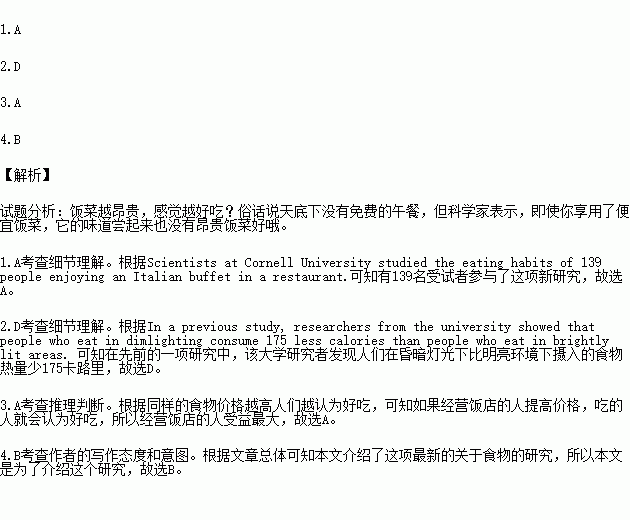题目内容
It is said that there’s no such thing a s a free lunch, but even if you manage to bag a bargain meal, it will not taste as good as a more expensive choice, according to scientists.
s a free lunch, but even if you manage to bag a bargain meal, it will not taste as good as a more expensive choice, according to scientists.
A new study has found that restaurant goers who pay more for their meals think the food is tastier than offered for a smaller price. The experts think that people tend to associate cost with quality and this changes their perception(感知) of how food tastes.
how food tastes.
Scientists at Cornell University studied the eating habits of 139 people enjoying an Italian buffet in a restaurant. The price of the food was set by the researchers at either $4 or $8 for the all-you-can-eat meal. Customers were asked to rate how good the food tasted, the quality of the restaurant and to leave their names.
The experiment showed that the people who paid $8 enjoyed their meal 11% more than those who ate the “cheaper” buffet. Interestingly those that paid for the $4 buffet said they felt guiltier about loading up their plates and felt that they overate. However, the scientists said that both groups ate around the same quantity of food in total.
Brian Wansink, a professor of consumer behavior at the university, said: “We were fascinated to find that pricing has little effect on how much one eats, but a huge effect on how you interpret the experience.” He thinks that people enjoyed their food more as they associated cost with quality and that small changes to a restaurant can change how tasty people find their meals.
In a previous study, researchers from the university showed that people who eat in bright lighting consume more than people who eat in less brightly lit areas.
1. We can learn from the passage that ________.
A. there were 139 subjects involved in the new study
B. a free lunch might be as delicious as you expected
C. the high pricing will change the exact taste of the food
D. in the experiment, the price of the food ranged from $4 to $8
2.According to the passage, which of the following factors has an effect on the quantity  of food a person consumes?
of food a person consumes?
A. The taste of the food.
B. The price of the food.
C. The number of companions.
D. The lighting of the restaurant.
3.Who will benefit most from the new study?
A. The person who runs a restaurant.
B. The person who often eats outside.
C. The person who works on decoration.
D. The person who studies in university.
4.The passage is intended to ________.
A. promote marketing methods
B. inform readers of a new study
C. teach consumers how to eat better
D. find the association between cost and quality
 寒假大串联黄山书社系列答案
寒假大串联黄山书社系列答案

 nt party. My mum makes the better biscuits in the world, so I decide to ask her for help. Mum taught me some basic step of baking. I insisted on doing most of the baking myself. I thought the biscuits were really well. My only mistake was that I dropped some on the floor after I was packing them up.
nt party. My mum makes the better biscuits in the world, so I decide to ask her for help. Mum taught me some basic step of baking. I insisted on doing most of the baking myself. I thought the biscuits were really well. My only mistake was that I dropped some on the floor after I was packing them up.